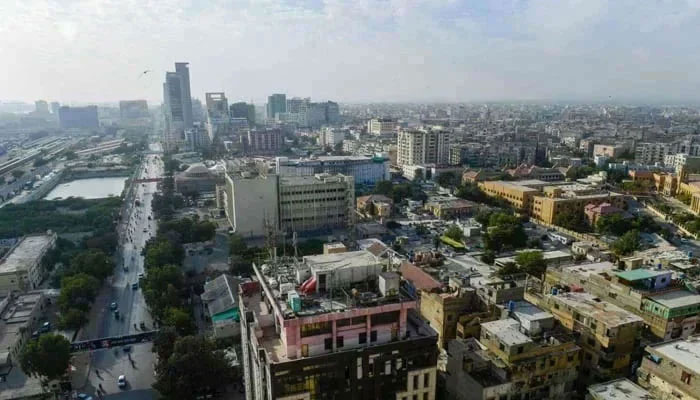70pc of city’s buildings lack adequate fire safety measures: expert
Karachi has witnessed nearly 6,000 fires during the past two years, yet 70 per cent of the city’s residential, commercial and industrial buildings lack adequate fire safety measures, an expert revealed on Tuesday.
Speaking at the Second National Fire Safety Conference and Risk-Based Awards Ceremony, organised by the Fire Protection Association of Pakistan (FPAP), specialists stressed the dire need for compliance with building safety codes to prevent loss of lives and properties.
Highlighting the alarming statistics, FPAP President Kanwar Waseem revealed that 2,800 fires were reported in Karachi in 2023, while over 3,000 were recorded in 2024 through November, leading to significant loss of lives and properties. Waseem attributed these incidents to widespread non-compliance with fire safety laws, and the absence of building safety codes during construction. “Seventy per cent of Karachi’s residential, commercial and industrial buildings are devoid of fire safety arrangements. The neglect of safety codes during construction makes these buildings death traps during emergencies.”
He also lamented the discontinuation of fire safety and first aid training in schools and colleges. “We used to provide such training in educational institutions. It’s essential to resume these sessions to instil fire safety knowledge from an early age.” He maintained that Karachi’s industrial sector, comprising over 8,000 units, remains particularly vulnerable. He called for mandatory fire safety training for industrial employees to mitigate risks.
FPAP Training Director Tariq Moeen revealed shocking gaps in emergency preparedness in the city’s high-rises. “Seventy per cent of the buildings on II Chundrigar Road and 60 per cent on Sharea Faisal lack emergency exits. How are such building plans approved without these critical safety measures?”
Moeen emphasised the importance of educating residents on fire response protocols. “Many people don’t even know what to do during a fire emergency. Simple measures, like placing wet towels over the head to minimise inhaling smoke, can save lives.”
In a video message, Rescue 1122 founder Dr Rizwan Naseer criticised the public’s lack of basic fire safety awareness. “Unlike Americans and Europeans, who cover their heads with wet towels while escaping fires, we Asians run coughing without understanding basic safety protocols. Fire safety education must begin in childhood.” The Karachi Metropolitan Corporation’s former chief fire officer Mubeen Ahmed pointed out that many shopping malls and high-rises in Karachi block emergency exits with concrete walls, leaving outsiders unaware of ongoing emergencies and depriving occupants of evacuation routes.
Experts at the conference noted that the majority of newly constructed high-rises and housing societies, particularly along highways, lack fire emergency systems. While building control rules exist, their enforcement is almost non-existent, they observed.
-
 Princess Beatrice, Eugenie Are ‘not Innocent’ In Epstein Drama
Princess Beatrice, Eugenie Are ‘not Innocent’ In Epstein Drama -
 Reese Witherspoon Goes 'boss' Mode On 'Legally Blonde' Prequel
Reese Witherspoon Goes 'boss' Mode On 'Legally Blonde' Prequel -
 Chris Hemsworth And Elsa Pataky Open Up About Raising Their Three Children In Australia
Chris Hemsworth And Elsa Pataky Open Up About Raising Their Three Children In Australia -
 Record Set Straight On King Charles’ Reason For Financially Supporting Andrew And Not Harry
Record Set Straight On King Charles’ Reason For Financially Supporting Andrew And Not Harry -
 Michael Douglas Breaks Silence On Jack Nicholson's Constant Teasing
Michael Douglas Breaks Silence On Jack Nicholson's Constant Teasing -
 How Prince Edward Was ‘bullied’ By Brother Andrew Mountbatten Windsor
How Prince Edward Was ‘bullied’ By Brother Andrew Mountbatten Windsor -
 'Kryptonite' Singer Brad Arnold Loses Battle With Cancer
'Kryptonite' Singer Brad Arnold Loses Battle With Cancer -
 Gabourey Sidibe Gets Candid About Balancing Motherhood And Career
Gabourey Sidibe Gets Candid About Balancing Motherhood And Career -
 Katherine Schwarzenegger Shares Sweet Detail From Early Romance Days With Chris Pratt
Katherine Schwarzenegger Shares Sweet Detail From Early Romance Days With Chris Pratt -
 Jennifer Hudson Gets Candid About Kelly Clarkson Calling It Day From Her Show
Jennifer Hudson Gets Candid About Kelly Clarkson Calling It Day From Her Show -
 Princess Diana, Sarah Ferguson Intense Rivalry Laid Bare
Princess Diana, Sarah Ferguson Intense Rivalry Laid Bare -
 Shamed Andrew Was With Jeffrey Epstein Night Of Virginia Giuffre Assault
Shamed Andrew Was With Jeffrey Epstein Night Of Virginia Giuffre Assault -
 Shamed Andrew’s Finances Predicted As King ‘will Not Leave Him Alone’
Shamed Andrew’s Finances Predicted As King ‘will Not Leave Him Alone’ -
 Expert Reveals Sarah Ferguson’s Tendencies After Reckless Behavior Over Eugenie ‘comes Home To Roost’
Expert Reveals Sarah Ferguson’s Tendencies After Reckless Behavior Over Eugenie ‘comes Home To Roost’ -
 Bad Bunny Faces Major Rumour About Personal Life Ahead Of Super Bowl Performance
Bad Bunny Faces Major Rumour About Personal Life Ahead Of Super Bowl Performance -
 Sarah Ferguson’s Links To Jeffrey Epstein Get More Entangled As Expert Talks Of A Testimony Call
Sarah Ferguson’s Links To Jeffrey Epstein Get More Entangled As Expert Talks Of A Testimony Call




